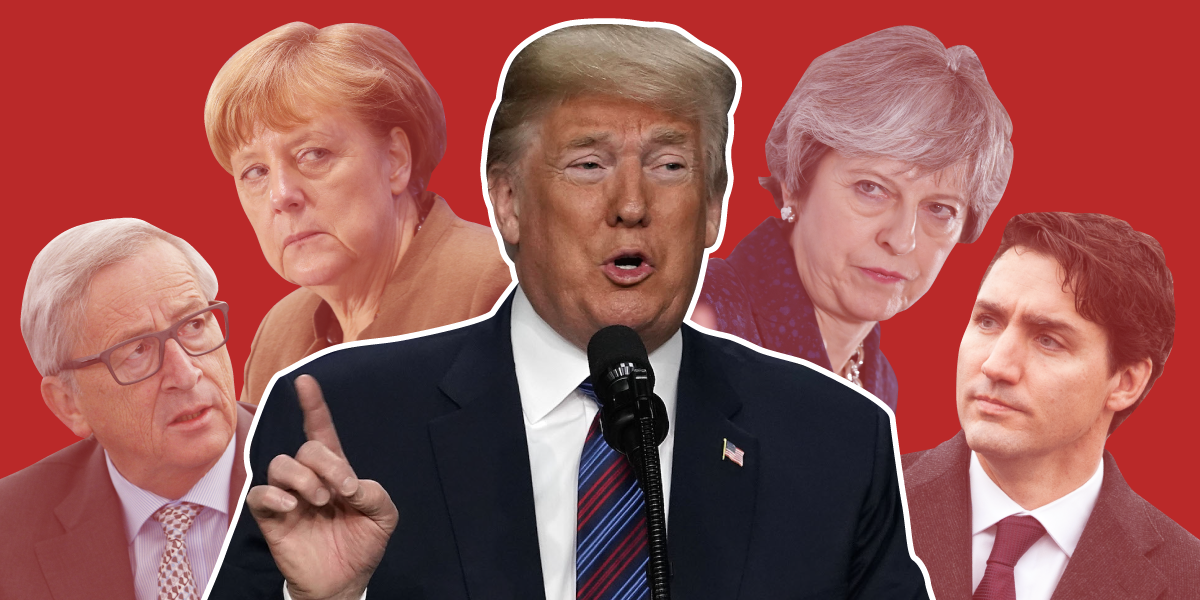- The Trump administration started imposing tariffs on European, Canadian, and Mexican steel and aluminum on Friday morning.
- The countries affected have responded furiously.
- Canada called it an “affront”, the UK said it was “patently absurd”, and the French compared it to a cowboy shoot-out.
US allies have been responding furiously to the Trump administration’s decision to impose steep tariffs on their steel and aluminum exports as part of an escalating trade war.
Starting Friday, steel imports from those countries will be hit with a 25% tariff, while aluminum imports will be hit with a 10% tariff. Tariffs are essentially taxes on foreign goods coming into a country – (you can read more about how that works here).
The Trump administration’s move is meant to be a show of support to the US steel and aluminum industries from foreign producers that undercut domestic prices. The White House previously said that protecting those industries was a matter of national security, although many experts have questioned that justification.
Here’s how European nations, Canada, and Mexico, have reacted to Trump’s latest move.

Britain: "Deeply disappointed"
Theresa May said on Friday that she was "deeply disappointed at the unjustified decision by the US to apply tariffs to EU steel and aluminium imports,"
She added: "The US, EU and UK are close allies and have always promoted values of open and fair trade across the world. Our steel and aluminium industries are hugely important to the UK, but they also contribute to US industry including in defence projects which bolster US national security."
UK Trade Secretary Liam Fox on Friday also slammed the tariffs as a "patently absurd" move, and said the UK government was considering counter-measures.
EU: "Totally unacceptable"
The EU handles trade policy for its 28 member states, many of which also responded separately, including Brit ian, Germany, and France.
Commission President Jean-Claude Juncker has threatened to hit back at the US with EU tariffs on equal value, telling reporters on Thursday: "It's totally unacceptable that a country is imposing unilateral measures when it comes to world trade."
The EU previously released a list of US products that would be subject to tariffs in the event the metal restrictions went into effect. It included blue jeans, motorcycles, boats, bourbon whiskey, rice, playing cards, and steel.
France: This is like the OK Corral
Bruno Le Maire, France's finance minister, echoed Juncker's warnings by saying: "Our US friends must know that if they were to take aggressive actions against Europe, Europe would not be without reaction."
Le Maire added: "World trade is not like the settling of accounts at the OK Corral," referring to a 30-second shootout between a law-and-order gang and a group of cowboys in Tombstone, Arizona, in 1881.
Le commerce mondial, ce n'est pas "Règlement de comptes à O.K. Corral" ! #multilatéralisme #acier #aluminium pic.twitter.com/kZfQljXImi
— Bruno Le Maire (@BrunoLeMaire) May 31, 2018
Canada: "Illegal and counterproductive."
Prime Minister Justin Trudeau described the move as "totally unacceptable" and an "affront to the thousands of Canadians who have fought and died alongside their American brothers in arms."
He also described the tariff impositions as "illegal and counterproductive" under NAFTA and WTO rules, and that Trump's national security justification was "simply ridiculous."
Trudeau added that Canada would impose "dollar for dollar tariffs" on US products, including steel and aluminum from July 1, which would remain in place until the US lifted its own tariffs. Other US consumer products that could be hit include maple syrup, pizza, and toilet paper.
Canadian Foreign Minister Chrystia Freeland told reporters that Canada's retaliatory tariffs were "strongest action by Canada in the post-War era."

Mexico: Let's keep it in proportion.
Mexican Economy Minister Ildefonso Guajardo described the new landscape as a "clearly defined battlefield," but not a trade war. He also vowed that the country would take revenge proportionally.
He told Mexican radio on Thursday, as cited by Reuters: "A trade war is when there is an escalation of conflict. In this case, it is simply a response to a first action.
"We should stick to the clearly defined battlefield, where the response is appropriate and proportional."
In a separate statement on Thursday, the Mexican government also called Trump's new tariffs "measures that affect and distort international commerce in goods," and that they were "neither adequate nor justified," according to The Hill.
It said it would "impose equivalent measures" on US goods including foil, lamps, pork legs and shoulders, apples, and cheese.
Germany: No insults, but trying to fix it.
The country's economic minister, Peter Altmaier, said his country would stand with the EU and even work "more closely" with Mexico and Canada, who were also hit by the trade war.

Altmaier told German TV on Friday, according to Reuters: "We tried to do it through negotiation and we will now do it by standing together and formulating a common European answer, possibly working more closely with Mexico and Canada."

What the US says
US Commerce Secretary Wilbur Ross, who announced the tariffs, said on Thursday that there was "nothing weird" about the countries' reactions, and that they "will get over that in due course."
Trump also tweeted that day: "FAIR TRADE!"

